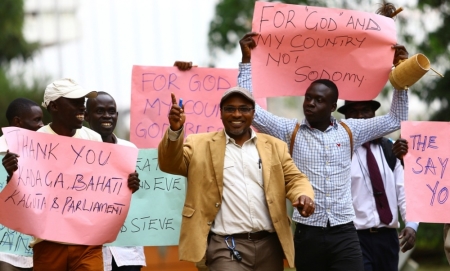Uganda May Pass New Law Criminalizing the Promotion of Sodomy

Uganda is preparing to introduce new anti-homosexuality legislation that will punish the promotion of unnatural acts, a government minister revealed. Gay activists are calling the proposed law even more draconian than the one that was annulled in August and condemned by human rights groups, because it imposed prison sentences for aggravated homosexuality, and having sex with a minor while HIV positive.
BBC News reported on Monday that the minister, who wasn't named, explained that although the proposed law will not explicitly refer to homosexuality, it will rely on a penal code that punishes "unnatural acts" with life sentences.
Same-sex relations in Uganda are illegal, but in 2013 there were significant attempts to pass a bill that punished repeated gay acts with the death penalty.
A later version of the bill criminalized the promotion of homosexuality and mandated citizens to report to police those who were suspected of committing aggravated sexual assault. Although that bill was signed into law in early 2014, a panel of five judges at Uganda's Constitutional Court invalidated the legislation in August.
The Anglican Church of Uganda had backed the last anti-homosexiuality bill and threatened to break from the Church of England over pressure to the resist the law.
Top Uganda Anglican Archbishop Stanley Ntagali previously said, "the issue here is respect for our views on homosexuality, same-sex marriage as a country and church. If they are not willing to listen to us, we shall consider being on our own."
The new "Prohibition of Promotion of Unnatural Sexual Practices Bill" is expected to increase the popularity of the ruling government among the conservative Ugandan society, but it's also expected to face heavy pressure from Western countries.
The bill is also set to clarify what is meant by promoting unnatural acts, the anonymous minister said.
Gay activist Frank Mugisha told The Guardian: "People don't realize that the 'promotion' part of it will affect everybody. If newspapers report about homosexuality it could be seen as promotion. My Twitter account could be seen as promotion. All human rights groups that include LGBT rights defence in their activities could be accused of promotion."
Mugisha added that the bill supports punishing anyone convicted of promoting homosexuality with seven years in prison. Legislators are planning on presenting the bill to parliament before the end of the year.
"They have just twisted the language but it is the same thing. It's actually worse because the 'promotion' part is harsher and it will punish the funding of LGBT and human rights groups," Mugisha claimed.
Although many in Uganda's conservative society have supported such initiatives, some church leaders, including a Roman Catholic Church cardinal, have argued that gay people "are not criminals." The comment came in March from Cardinal Peter Turkson of Ghana, president of the Pontifical Council for Justice and Peace, who was speaking at a church and human rights conference in Slovakia.






















